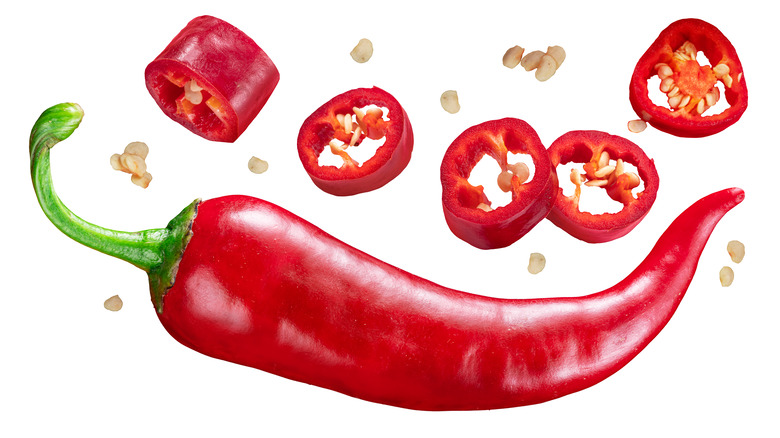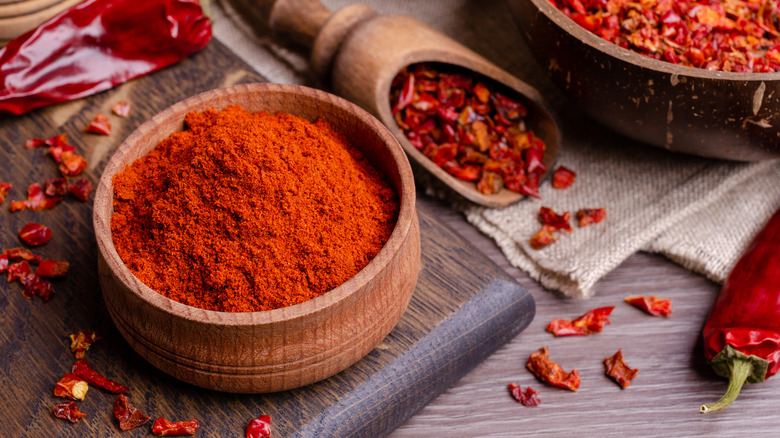Here's Why Some People Like Spicy Food
Picture this: A large group of people convenes at a traditional Thai restaurant. When the server comes around, they ask how spicy each diner wants their dish on a scale of one through five. One person might boldly volunteer to order first, attempting to impress their fellow dinner guests by opting for the highest level of heat in their chicken khao soi. Another member of the party might go the opposite route, stressing that even the tiniest amount of spice in their pad thai is probably too much for their sensitive taste buds. Everyone else may opt for somewhere in the middle.
If an anthropologist were invited to the party, they might go around and ask each person what a typical meal looked like in their households growing up, along with some other questions about their backgrounds. They'd possibly find that the person who ordered a dish at a heat level of five was introduced to peppers with moderate-to-high Scoville units at a young age, while the person who ordered their's at heat level one person came from a family that considered black pepper to be the spiciest thing in their pantry. When it comes to spice tolerance, the food we eat in our formative years invariably plays a role in how much heat we can take as adults. In fact, the very detection of spice on our tongues may be entirely in our minds.
If you can't handle the heat, can changing your outlook help?
According to Thrillist, there could be several factors at play that divide people on spicy food. Bill Phillips, a chef and professor at the Culinary Institute of America, explained to the outlet that the burning sensation we experience when we eat spicy foods is "actually a trick of the mind." So, why do spicy foods taste spicy if it's all in our heads? According to Phillips, that fieriness comes from chemical molecules like capsaicin, which "excite pain receptors on your tongue that are linked to the sensation of temperature." (As Thrillist noted, mint can have a similar effect.)
Contrary to the belief that genetics are partly responsible for our affinity for or aversion to spice, Phillips argues that a love of spice is "acquired over time" — and that the more spicy food molecules one ingests, the weaker their pain-signaling neurotransmitter becomes, thus boosting one's tolerance. Per Thrillist, this education of the palette, as it were, could be the reason why people from countries with significantly spicier food, like Mexico and Thailand, are more inclined to opt for the highest number on the spice scale.
The science of spice
Despite the theory that how we experience heat by way of spice might be a mix of nurture and nature minus genetics, not everyone is on the same page. If you ask Jim White, a registered dietician and exercise physiologist, genetics might play a role in our taste receptors after all. Speaking with the food site Eat This Not That, White argues that our stance on heat may even start to develop in the womb — and that development is based on our mother's dietary habits. "This means the foods your mom was eating while she was pregnant and breastfeeding can also influence the foods you tend to favor—such as spicy, sweet, or salty," says White.
An article published by Stanford University's The Dish On Science noted some research evidenced that genetics "account for 18% to 58% of humans' spice tolerance," and that findings from a study that observed a pair of identical twins saw both were "more likely to show matching spice preferences." The Dish on Science also noted the "context effect" — in other words, that invisible force of attitude that varies from household to household and influences its members on matters of food. If you're trying to increase your spice tolerance as an adult, the context effect can work in your favor; per The Dish on Science, practicing "repeated consumption" can have a big impact on one's "internal guide" to what's hot and what's not.


